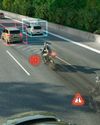Motorcycles have featured front suspension for over a century, with BMW being the first manufacturer to produce a motorcycle with hydraulically damped telescopic forks in 1935. Currently, a majority of motorcycles use telescopic forks for the front suspension. The telescopic front fork is made of fork bodies, which are the shock absorbers that contain coil springs inside an oil-sealed enclosure, into which the solid fork tubes, or stanchions, slide to provide damping action.

Motorcycle suspension serves dual purposes – contributing to the vehicle’s handling and braking, as well as providing safety and comfort by isolating road noise, bumps and vibration. There have been various iterations of two-wheeler front suspension over the years, from Telelever and Duolever forks (used by BMW), right up to single-sided front set-up and front swingarms with hubcentre steering. However, telescopic suspension systems have survived the longest, and seem to be the most practical solution for motorcycle front suspension system.
Within telescopic front suspension systems, the traditional setup was with the stanchions being mounted to the top, and the fork bodies at the axle. But starting in the 1980s, motorcycle racing teams changed the orientation of the front fork by inverting it, resulting in the ‘UpsideDown Fork’ or the ‘Inverted Fork.’ In this setup, the bigger, fork bodies are mounted to the triple clamp and the stanchions are at the bottom, clamping on to the front axle. The inside of USD front forks, however, is almost exactly similar to that of traditional telescopic suspension. Each fork body is essentially made up of a piston, valves, cylinder and side pipe.
THE USD DIFFERENCE
The unsprung weight (wheels and part of the suspension itself) on a motorcycle negatively affects its handling capabilities. Turning of the handlebar creates a large amount of twisting pressure on the point at which the suspension system is fitted on the triple clamp. The dimensions of the fork, including the stanchions and the fork bodies, are designed to ensure that the amount of force that can be handled. The setup of USD forks results in lower unsprung weight on a motorcycle, since the lighter components of the suspension are placed at the bottom.
Esta historia es de la edición January 2017 de Auto Tech Review.
Comience su prueba gratuita de Magzter GOLD de 7 días para acceder a miles de historias premium seleccionadas y a más de 9,000 revistas y periódicos.
Ya eres suscriptor ? Conectar
Esta historia es de la edición January 2017 de Auto Tech Review.
Comience su prueba gratuita de Magzter GOLD de 7 días para acceder a miles de historias premium seleccionadas y a más de 9,000 revistas y periódicos.
Ya eres suscriptor? Conectar

Sound Generation For Enhanced Road Safety
With an ever-increasing number of fully electric and hybrid vehicles entering the market, we are witnessing a change in the acoustic experience in and around the car. The silent nature of the electric powertrain means that other road users miss the familiar acoustic cues that warn them of an approaching vehicle. To remedy this situation, Harman is working on various noise management solutions.

OBJECTIVE ASSESSMENT OF THE SAFETY CONTRIBUTION OF TODAY'S AUTOMOTIVE HEADLAMPS
Good lighting makes a major contribution to road safety. In 2011, the International Commission on Illumination (CIE) presented an evaluation system for headlamps that can objectively assess the quality of illumination and glare limitation. New light sources like LEDs and lighting functions (glare-free high beam, partial high beam) have been available for several years, so that an extension of the proven CIE method is necessary, which takes into account, among other things, changed switch-on and service lives of new lighting functions and represents a generally understandable evaluation system. An evaluation system presented in the following by the Technische Uni versität Darmstadt, which was developed by an encompassing expert commission, is intended to provide representative data and enable an objective evaluation of headlamp performance.

RAPIDO RE-INNOVATES TO CATER TO POST COVID-19 LAST MILE CONNECTIVITY
The rapid pace of urbanisation in the country has witnessed cities expanding and subsuming surrounding villages and smaller towns, evolving into Tier II and III cities.

FUNCTIONAL SAFETY STANDARDS TOP PRIORITY FOR FUTURE AUTOMOTIVE DEPLOYMENT
Increasing levels of electronic content in vehicles result in a large amount of software that is required to run the scenes behind the mechanical aspects of a vehicle. Electronic systems in automobiles are part of every section, from the powertrain to comfort and convenience systems as well as all types of safety equipment. This makes electronics and the software running these systems a critical part of the equation for future mobility solutions. In addition, putting standards in place to measure methods of developing, testing and functioning of such electronic systems also becomes highly relevant.

“BYD'S EV STRATEGY TO ENCOMPASS MOST FORMS OF TRANSPORTATION NEEDS IN INDIA”
The country’s electric vehicle (EV) ecosystem is grappling with a plethora of challenges even as it is striving to wriggle itself out of the ‘nascent stage’ tag. In an exclusive chat with Auto Tech Review, Zhang Jie Ketsu, Executive Director, BYD India shares his perspective on the current EV scenario and how the company intends to progress faster in the Indian automotive industry

SAFETY IN ELECTRIC AND AUTONOMOUS CARS – SIMULATION OF COMPLEX CRASH SCENARIOS
Electric and autonomous vehicles allow for novel seating arrangements and packaging strategies, presenting new safety challenges. Physical crash testing must be supplemented with virtual simulation to ensure vehicle safety on shorter development cycles. With its Simcenter Madymo MBS software, Siemens provides improved runtimes and the Active Human model, enabling accurate and rapid occupant safety analysis in complex crash scenarios.

KIA SONET – A MIGHTY OFFERING IN THE COMPACT SUV SEGMENT
It wouldn't be wrong to say that Kia Motors India has taken the Indian market by storm in less than 12 months of its presence in the market.

NISSAN'S NEW DIRECTION: ARIYA ALL-ELECTRIC
Marking a key milestone in Nissan’s transformation strategy, Ariya ticks a lot of boxes highlighting the strengths of the global automotive giant.

BETTER SAFETY WITH EMERGENCY BRAKE ASSIST FOR MOTORCYCLES
Rear-end collisions with a slower vehicle suddenly cutting into the lane and intersection accidents with cross-traffic are among the most frequent motorcycle accident types. Continental is now developing an emergency brake assist, which detects an imminent collision with a vehicle ahead or with an obstacle, warns the rider and supports him during braking

ADAS WILL SERVE AS CATALYST FOR IMPROVED VEHICLE SAFETY
The automotive industry across the globe is increasingly focussing on safety.